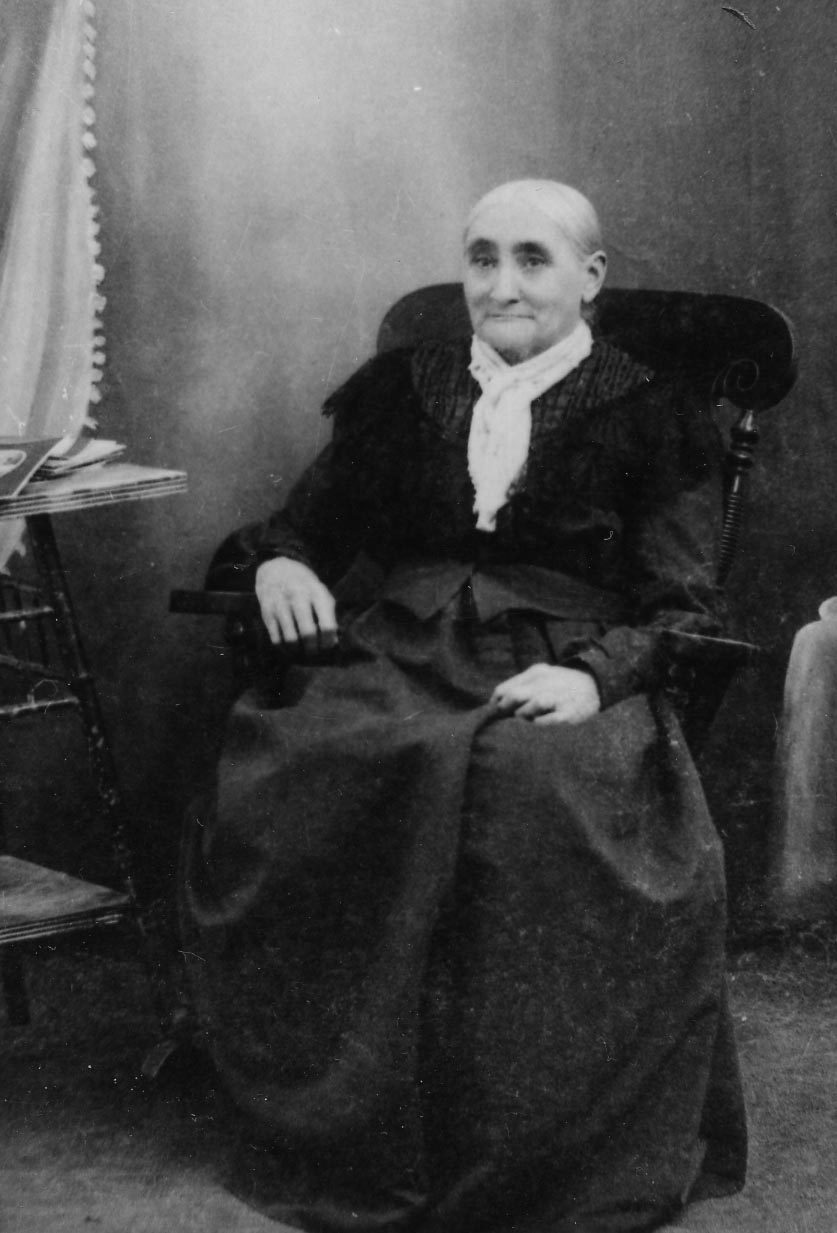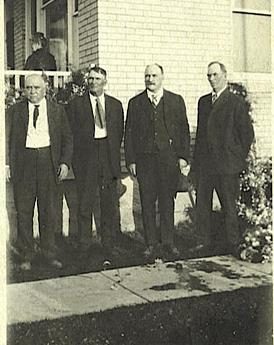(Fanny Burgess gives a short history of her life).
I was born January 27, 1829, in a small town called Battle, County of Sussex, of England. My Parents, Joseph Burgess and Martha Jarrett, were working people in a farming district. They were followers of John Wesley and very strict in their religion as far as they knew, strict observers of the Sabbath Day.
IIn 1849, I was married to William Osborne Gorringe, a native of Brighton, Sussex. In the spring of 1854, we first heard the Mormons spoken of as a very bad set of people and nothing good was said of them. We thought we would go and hear for ourselves what they did preach and the first meeting we attended we were satisfied that it was the true Bible doctrine. It seemed to me like something I had known before and was waiting for.
In a short time we were baptized by Elder Henry Holist the presiding Elder of the branch and confirmed the same day. Previous to that time we had not joined any religion. I have never regretted it. This new gospel was to our souls as dew to the thirsty flowers. I was the youngest of my father’s family and as I could understand the principles of the gospel so plain. I thought my parents and my sisters would understand them the same.
We were so overjoyed with this new plan of salvation we hastened to inform our friends and relatives of the glad tidings that they might partake of this glorious news, but alas! It was not so, their religion, they had had all their life was good enough for them. What was light and life to us was spurned and neglected by all our kindred, so we were the only ones of our family that received the truth. I was disappointed, but I must say they did not oppose me. My husband was the only child, his father was dead and his mother could not see the gospel as we did. His mother had wanted him to not use tobacco and when he joined the church he quit the use of tobacco. At one time, when his mother came to visit us she brought him some choice tobacco but he said, “Mother, that is of no use to me now.” She thought he was very foolish to give up so much for the gospel.
Our whole desire was to go to America and gather with the saints, and not knowing how to get the means to go with, we prayed to our Heavenly Father to open up the way. Just at that time, we received a letter from my brother, Edward, who lived in Australia, He had lived there for a number of years and had accumulated means and was quite wealthy. In the letter there was $25,00 which made us feel as though the Lord had answered our prayers. My brother was desirous to see us better our condition and said if any of us would come he would send us money to come on. But we could not give up our religion. So we wrote to him and told him that we had made up our minds to go to America as soon as we could raise the means to go with. After my brother received the letter, he immediately sent the money. You can’t imagine the joy that came to our hearts. We immediately made preparations for our journey to America.
We left in the spring of 1855 sailing from Liverpool on the 22nd of April in a sailing vessel called “Samuel Curling,” the name of the Captain. When we set sail on the great ocean, we felt as though we were alone in life’s struggles, but received many manifestations of the Master’s watchful care. We were four weeks on the sea, and landed at New York. While there were no deaths en route, there was a terrible storm while we were on the ocean. At one time, it looked like the vessel would sink, even the Captain of the ship was frightened and asked if there was anyone there who could pray. In the midst Brother Barlow, a returning missionary and president of our company of saints, came forward and asked the people to be calm and prayed to the Heavenly Father for protection. Then he told the people not to be frightened because there were guardian angels all around us steadying and holding up the ship. It was undoubtedly the case, for the Captain steering the ship said that it was the severest storm he had ever witnessed that did not terminate in serious results. This experience strengthened our faith.
From New York, we traveled some time by rail, some by steamboat on rivers until we reached Atchison on the Missouri River. We camped at a place called “Mormon Grove” four weeks. Some of the Brethren going farther up the river to buy cattle. Others fixing up wagons preparing for the overland journey, some of which was made by ox teams. Many accident might be mentioned that occurred on the journey, some of which are recorded on page 45 to 47 in my record book. One I will mention here. When we reached the Black Hills quite a dangerous place to go down, I was quite sick at that time and having a baby girl one year and a half old and a boy three years; I did not feel able to walk and carry my baby, when a young sister from another wagon said she would take my baby. So I got out and walked down the dangerous hill. My husband being engaged with the team, when about half-way down the hill the wagon tipped over and the axle broke. Had I been in the wagon I might have been killed or badly injured. We had to stop there the next day to repair the wagons, but it was good to have a rest sometimes.
One other incident I will relate tested our faith and endurance as we were crossing the plains. The captain of the company, Brother Charles Harper, had given instructions that we should all stay together for the Indians were very hostile and if any of them should camp alone we might be scalped. The wagon in which I traveled there were five adults and five children all under five years of age. We were all obliged to walk a great deal of the time to lighten the load for the ox team.
One day our wagon mired in the mud. The teams that were behind passed on and seeing there were two men with our unfortunate team, they offered no assistance. We women with the children walked on ahead thinking the wagon would soon be able to follow. We traveled on, occasionally looking back in hopes of seeing our team coming, but no, they were not in sight. The company ahead had long since faded from our view. The shadows of night began to fall. We were becoming fatigued and hungry. The children were crying for bread. Imagine if you can the feelings of us three helpless females, each with a babe in our arms. The other two children had to be led, the oldest not five years old. Alone on the plains, not a soul in sight, not a morsel of food, not a drop of water for our children we knew not what moment we might meet a horrible death at the hands of the savages. Night had come on. The darkness was so dense we could no longer see to travel so we sat by the roadside and soothed our little ones to sleep scarcely daring to breath and speaking in whispers for fear the Indians might be near.
Then the wolves’s fierce howl has heard. Oh what a chill of fear that sound sent to our hearts. Nearer and nearer they came. It was so dark we could not see the wolves. What was to be done? What could we do? We had no way to defend ourselves, must we meet death her and have our darling babes torn from our arms, and devoured in that awful moment? One of the sisters said, “Let us sing a hymn.” Trembling and fervently our voices rose on the air first in song and then in prayer. God heard our plea. Instantly the howling of the wolves ceased and all was quiet. Not a sound was heard. For hours we sat thus.
Then listen, yes. There was someone coming. We could hear footsteps. Was it friend or foe? Was it someone to help us or was it a savage? A voice said, “Who is there?” We all recognized the voice of one of the Brethren from our wagon. No music was ever so sweet to our ears. We learned from that Brother that we would have to walk to where the company was camped which was five miles ahead. This seemed almost impossible, we were so fatigued with our day’s journey and the want of food, but strength was given us and with the help of the Brother, we reached the camp a little before 2:00 a.m. and thanked God that our lives had been spared.
At times, when we arrived on the Sweet Water, it was very cold through the night. The bread we baked in the evening (as was our custom) was frozen so hard in the morning that we had to chop it with the axe and thaw it before we could eat it. It got much warmer through the day. We did not have it so cold after that. It wasn’t exactly a pleasure trip, crossing the plains by ox team, but we did not feel to murmur at small things, as we knew we were traveling to Zion. We arrived in Salt Lake City on October 31,1855 and we were very thankful to our Heavenly Father for the protecting care over us and all the camp. Only one death while crossing the plains, that was a little child eight months old.
We stayed in Salt Lake City not quite two months, then went to Bountiful (then Sessions Settlement). Grasshoppers had done damage to the grain crops that summer which made bread quite scarce, but my husband being a shoemaker, found plenty of work and we never wanted for bread. I was identified with the Relief society, when it was first organized in the Sessions Settlement. I was a teacher in the Relief Society for a short time, but cannot give the dates, as I did not keep a diary. I resided in Bountiful from 1855 til 1884 when I moved to Marion, Idaho. We arrived November 20th, 1884. For seven years I was the president of the Relief Society in Marion. My daughter Lydia Gorringe and two sons Edward Victor and Alfred Gorringe came also. I went through many trials and had to rely upon the Lord and help was not forsaken me. I was a faithful worker in the church. I pray that you, who are my posterity will be faithful also.
Visit FamilySearch to learn more about Fanny Burgess and other ancestors. Also visit the Thomas Tolman Family Organization to find out how you can get more involved in family history.
Related Stories



